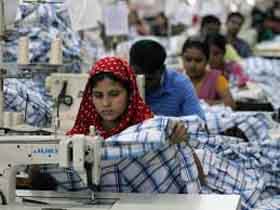Both the BGMEA and BKMEA data showed a remarkable hike in their respective membership categories
Despite the political unrest coupled with global retailers’ threat not to buy Bangladeshi products following the worst-ever Rana Plaza disaster, the country, however, witnessed a slow but steady growth in the apparel sector in 2013.
A good number of apparel manufacturers have come up with more investments either to establish or to expand their own readymade garment factories in the just concluded year, according to the statistics Bangladesh Garment manufacturers and Exporters Association (BGMEA) and Bangladesh Knitwear Manufacturers and Exporters Association (BKMEA). Apart from that, both the BGMEA and BKMEA data showed a remarkable hike in their respective membership categories.
According to statistics, a total of 192 factory owners got the memberships from BGMEA and BKMEA. A total of 139 factory owners took membership from BGMEA, while BKMEA provided membership to 53 factory owners in the year 2013. Currently, the BGMEA membership number rose to 5674, while the memberships of BKMEA rose to 1931.
“The number of new RMG factories could have been even more in the last year. Most of the entrepreneurs were eventually refrained from investing further as they were really shaken to see the global outcry following the worst-ever Rana Plaza disaster,’’ Anwarul Alam Chowdhury Parvez, former president of BGMEA, told the Dhaka Tribune yesterday.
Besides, the investors also became nervous and frightened to see the streets violence during political programmes, which may also cast negative impact in the coming years, he added.
Compared to the RMG factory growth in 2012, the number of new factories has declined in the year 2013 as the entrepreneurs were reluctant to invest in this sector due to the political unrest and factory disaster, said Shahidullah Azim, vice president of BGMEA.
Industry insiders opined that the investment in this sector was supposed to be more but factory disasters such as Rana plaza building collapse, which claimed over 1,100 workers and injured more than 2,500 workers, brought a big blow in the investment in RMG sector.
Political deadlock which continued at throughout the year could also be blamed for the slow growth in the RMG sector, they added.
The new factories can lead the country’s RMG sector to a compliant one as they were built as compliant factories with the bulling code. That’s why the government should provide gas and electricity supply to those factories on priority basis to maintain the growth of this sector, said Abdus Salam Murshedy, managing director of Envoy group.
“We are still hoping that Bangladesh would be able to overcome all the obstacles to lead the country in the global competitive market.”
Source: Dhaka Tribune










